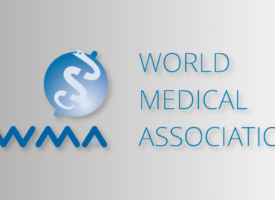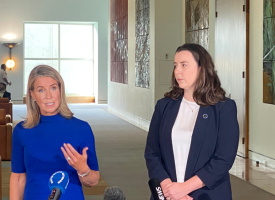AMA Transcript - Health care of detained asylum seekers
Transcript: AMA President, A/Prof Brian Owler, Sky News Lunchtime Agenda, 19 February 2015
Subject: Health care of detained asylum seekers
TOM CONNELL: The Government's GP co-payment has already had many incarnations and perhaps it's about to undergo one final makeover. Health Minister Sussan Ley has this week indicated there could be a two-tiered payment. That is, two different co-payments depending on how much someone is earning. We know the Government is this time around doing things by consultation, so it's likely whatever plan they come up with, it will have the blessing of the Australian Medical Association, a lobby group representing Australian doctors.
The President of the AMA, Associate Professor Brian Owler, joins me now from the Sky News centre to discuss this. First of all, thanks for your time today, Brian Owler. I would like to start on a little bit of a different note. This report we saw from the Human Rights Commission on the health and treatment of refugees and asylum seekers, plenty of political debate and reaction. What's the AMA's position on all of this?
BRIAN OWLER: Well, the AMA made its position quite clear back in December 2011 when my predecessor outlined the fact that we needed to get children out of detention. Detention is not a safe place for children and this report clearly defines that by the number of assaults, including sexual assaults, unfortunately, that have happened to children, but also the effects on children's health, particularly mental health. And these are problems that don't just stop when they're removed from detention. These are problems that continue into the future. And I think what we need to be doing is focusing on the issue of the children in detention and how we're actually looking after them now in the community rather than focusing on the politics. I think we should acknowledge that [Former Immigration] Minister [Scott] Morrison has reduced the number of children in detention very significantly, but obviously we want to make sure that all of those children who are now - so 119, I think, that are still in Nauru, all of those who are removed and are out into the community in a much safer environment.
TOM CONNELL: I understand, as well, you're again calling for this independent panel of doctors that used to oversee the health of people being held in Manus Island in Nauru - for that to be re-established. That was gotten rid of.
BRIAN OWLER: Well, that's right. I think one of the problems that we've got here is an issue of transparency. I think there are a lot of people, particularly doctors, that have been involved in the care of asylum seekers - and not just children, but right across the board - have been very concerned about the provision of health care. We know there are instances sort of still under investigation that are very concerning. The standard of health care, particularly in offshore centres such as Nauru and Manus Island, is well below that we would expect on the mainland, and I think having some sort of independent health group as there used to be, indeed, to actually oversee that and provide some sort of transparency, that gives, I think, the Australian people the reassurance that we're actually fulfilling at least the obligations of providing good health care to people that are in detention, is something that we really want to carry through.
TOM CONNELL: Okay. And on to the GP co-payment or the Minister, more broadly, I suppose. Sussan Ley has been in this portfolio for a little bit more than two months. Have you found any difference between the way she's dealt with your organisation and her predecessor, Peter Dutton?
BRIAN OWLER: Well look, there's no secret that our relationship with [Former Health] Minister [Peter] Dutton was somewhat strained, and it is refreshing, I've got to say, to have a Minister that's enthusiastic about the portfolio, that is out there talking, not just to the AMA and other health groups but to GPs and other doctors right across the country. And I think that's an important part of the process of getting across the portfolio. It's a complex portfolio, and I think she's gaining a good understanding of what some of the issues are. And there's certainly common themes that are coming through to her about what needs to be done in the future.
TOM CONNELL: The thing we've sort of got from indications from both the Minister and also the Prime Minister, Tony Abbott, is that there won't be major changes in this area unless they get the approval of groups such as your group, the AMA. Now, does that mean that your proposal we heard about last year, the $6.15 co-payment exempting as well vulnerable groups, is that the thing you're pushing for? Do you understand whether that is likely to go ahead in something close to that form?
BRIAN OWLER: Well look, I think the most important thing is that we do have protection for the vulnerable patients. I mean, that was always our concern. We need to make sure that practices are viable, particularly in those areas that are disadvantaged, and we need to make sure that we value prevention and chronic disease management, all the good things that general practice should be doing. And so, any investment in general practice is going to be welcome. That was part of our model. There are certainly elements of the model that we are continuing to push. Whether the model ends up being similar to the AMA plan or another reincarnation of it, we are open to any of those suggestions, and obviously we'll work with the Minister, with the input of other health groups as well, to come up with something we can all support.
TOM CONNELL: You said you need to make sure as well that practices are viable. Is there an element of that that is actually front and centre to your policy? If you look at your proposal, the $6.15 co-payment, the Government says that would give 97 per cent of the money raised or saved - however you want to look at it - back to doctors. Now, when people look at you as a doctor's lobby group and they see that your plan gives the most money back to GPs, are they entitled to be sceptical about your first concern here?
BRIAN OWLER: Well, they may be, but it's well-founded. I mean, general practice is one of the most efficient parts of the health care system, and what we actually need to be doing is investing in general practice. It allows people, not to buy a better car, but to actually employ a practice nurse and provide a better quality service. If you want quality general practice, then we need to make some investment. GPs have been putting up with a falling rebate in real terms for decades, and the value of the rebate now no longer represents the cost or the value of the service that they provide. So, if we are to redress that, we need to invest, because general practice often saves money when it comes to other parts of the health care system, such as hospitals.
TOM CONNELL: I'm interested as well, obviously you've been talking about the dangers of a co-payment for people that can't afford it, but for those that can afford it, we know there are plenty of people who are already paying much more than $5 to go to the doctor. Often half of the cost, close to $40. Do you find the argument strange from Labor, for example, that they say this is some sort of ideological attack on Medicare and its very universality?
BRIAN OWLER: Well, I think we do need to get back to the idea of universality. And universality is not everything is free; it means that we should have universal access to affordable health care. So, where people can't afford to pay a co-payment they shouldn't be required to do so and that shouldn't be a barrier to them accessing care. But where other people can afford [indistinct]...
TOM CONNELL: [Interrupts] Right. That big song and dance about anyone paying the $7, it is a bit strange, isn't it? Because as you point out, people that can pay it are often paying a lot more than $7 or $5 or $6 already.
BRIAN OWLER: Well, that's right. So about 20 per cent of GP services attract some form of private billing. That is, some form of co-payment, if you will. About 80 per cent of services are bulk billed. But I think the real issue here is making sure that we have some discretion for the doctor who is in the best position to understand their patient, their particular, individual circumstances and, often, their ability to make a contribution. So, we need that sort of flexibility in the system, and that's something that's been lacking from the models to date. So, if we can introduce some flexibility, allow - make it easier for people to make a contribution if they're able to do so, but also protect all of those vulnerable patients, then that's the sort of model that we'll be looking forward to supporting.
TOM CONNELL: We'll see what does get thrashed out between yourself, other groups, and, of course, the Government. But Associate Professor Brian Owler, thanks for your time today on Sky News.
BRIAN OWLER: Pleasure. Thank you.
19 February 2015
CONTACT: John Flannery 02 6270 5477 / 0419 494 761
Odette Visser 02 6270 5412 / 0427 209 753



